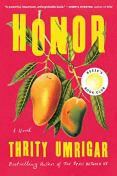BKMT READING GUIDES
Honor
by Thrity Umrigar
Paperback : 352 pages
20 clubs reading this now
3 members have read this book
“In the way A Thousand Splendid Suns told of Afghanistan’s women, Thrity Umrigar tells a story of India with the intimacy of one who knows the many facets of a land both modern and ancient, awash in contradictions.” —Lisa Wingate, #1 New ...
Introduction
THE JANUARY 2022 REESE'S BOOK CLUB PICK
“In the way A Thousand Splendid Suns told of Afghanistan’s women, Thrity Umrigar tells a story of India with the intimacy of one who knows the many facets of a land both modern and ancient, awash in contradictions.” —Lisa Wingate, #1 New York Times bestselling author of Before We Were Yours
In this riveting and immersive novel, bestselling author Thrity Umrigar tells the story of two couples and the sometimes dangerous and heartbreaking challenges of love across a cultural divide.
Indian American journalist Smita has returned to India to cover a story, but reluctantly: long ago she and her family left the country with no intention of ever coming back. As she follows the case of Meena—a Hindu woman attacked by members of her own village and her own family for marrying a Muslim man—Smita comes face to face with a society where tradition carries more weight than one’s own heart, and a story that threatens to unearth the painful secrets of Smita’s own past. While Meena’s fate hangs in the balance, Smita tries in every way she can to right the scales. She also finds herself increasingly drawn to Mohan, an Indian man she meets while on assignment. But the dual love stories of Honor are as different as the cultures of Meena and Smita themselves: Smita realizes she has the freedom to enter into a casual affair, knowing she can decide later how much it means to her.
In this tender and evocative novel about love, hope, familial devotion, betrayal, and sacrifice, Thrity Umrigar shows us two courageous women trying to navigate how to be true to their homelands and themselves at the same time.
Editorial Review
No Editorial Review Currently AvailableDiscussion Questions
From the publisher:1. Smita tells Mohan that her India is not his India. What does she mean?
2. How is Meena’s India different from Smita’s? What explains the differences?
3. Meena relates her story to us directly, in the first person. Why do you think the author chose this point of view?
4. Meena’s brothers think they are doing the moral thing, the right thing, by punishing their sister and her husband. Honor killings are a fact of life in many parts of the world. What do you think it will take to change this cultural practice?
5. What do you think of a system where the village council and the head of that council have so much power? What are the consequences of those positions being held by men?
6. Why didn’t Smita’s father change their name back to their family name after settling in America? Do you understand why he didn’t?
7. Smita and Meena both fall in love. How do their cultures inform their relationships: the level of intimacy, communication, decision-making for each woman? If you are in a committed relationship, how do you think it would have been affected if it had begun in a different culture?
8. As strange as the customs and traditions described in this book may seem to an American reader, did you recognize any common touchpoints across the two cultures? What aspects of the novel reminded you of life in America?
9. Trace Mohan’s evolution in the course of his travels with Smita.
10. What do you think of Smita’s decision in the conclusion of the novel? What do you foresee for the future of Smita and Mohan?
11. There are many different levels of privilege described in this book. What are some of them, and how do they affect the characters’ behavior?
12. There is a moment when Smita remembers the marigolds tied around the oxen’s horns, and it makes her feel tender toward India. Why?
13. The notion of objectivity is the foundational belief in mainstream American journalism. What happens when journalists cover places and people whose culture is completely different from theirs? Should they strive to be objective, or should they identify a moral ground from which to report a story? If so, how do they determine what that moral ground should be? Or are they imposing their morality on others?
14. What do you think of the final chapter? What function does it serve?
15. What are the various meanings of the book’s title?
Book Club Recommendations
Recommended to book clubs by 1 of 1 members.
Book Club HQ to over 90,000+ book clubs and ready to welcome yours.
Get free weekly updates on top club picks, book giveaways, author events and more








